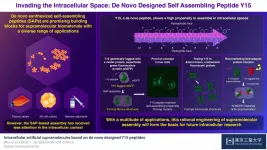INFORMATION:
About Mayo Clinic
Mayo Clinic is a nonprofit organization committed to innovation in clinical practice, education and research, and providing compassion, expertise and answers to everyone who needs healing. Visit the Mayo Clinic News Network for additional Mayo Clinic news. For information on COVID-19, including Mayo Clinic's Coronavirus Map tracking tool, which has 14-day forecasting on COVID-19 trends, visit the Mayo Clinic COVID-19 Resource Center.
Mayo Clinic study suggests patients with lung cancer be screened for MET oncogene
2021-07-01
(Press-News.org) ROCHESTER, Minn. -- Research by investigators at Mayo Clinic Cancer Center suggests that physicians should screen patients with lung cancer for MET amplification/overexpression before determining a treatment strategy. Their findings are published Cancer Discovery, a journal of the American Association for Cancer Research.
"In our research we found several lung cancer cases that were not responsive to standard chemotherapy," says Zhenkun Lou, Ph.D., a cancer researcher at Mayo Clinic. "Because these lung cancers were positive for PD-L1, a protein that allows some cells to escape attack by the immune system, we then tried treating these patients with anti-PD1 immunotherapy to relieve PD-L1 mediated immune suppression, however this treatment also failed."
Dr. Lou and his colleagues then used cell line animal models and patient tissue samples to study why these lung cancers were not responding to treatment.
"We discovered that in these particular cases, the cancer exhibited a MET oncogene amplification, which creates a hostile environment for immunotherapy," says Dr. Lou. Abnormal MET activation has been implicated as an oncogenic driver in non-small-cell lung cancer.
After analyzing several independent medical databases, Dr. Lou and his colleagues confirmed that MET oncogene amplification should be a factor to be considered when designing lung cancer therapy. In addition, they showed that in animal models, a combination of a MET inhibitor with anti-PD1 immunotherapy was effective in treating cancers with MET amplification.
"Our study suggests that patients with a MET oncogene amplification will not respond to immunotherapy alone and will require treatment with a combination of a MET inhibitor together with immunotherapy," says Dr. Lou. He cautions that this strategy will require confirmation in a prospective clinical trial before becoming a standard of care. In the meantime, Dr. Lou suggests that patients with lung cancer be screened for MET amplification/overexpression before determining an immunotherapy strategy.
ELSE PRESS RELEASES FROM THIS DATE:
Cleaner air has boosted US corn and soybean yields, Stanford-led research shows
2021-07-01
A key factor in America's prodigious agricultural output turns out to be something farmers can do little to control: clean air. A new Stanford-led study estimates pollution reductions between 1999 and 2019 contributed to about 20 percent of the increase in corn and soybean yield gains during that period - an amount worth about $5 billion per year.
The analysis, published this week in Environmental Research Letters, reveals that four key air pollutants are particularly damaging to crops, and accounted for an average loss of about 5 percent of corn and soybean production over the study period. The findings could help inform technology and policy changes to benefit American agriculture, and underscore the ...
How long can a person live? The 21st century may see a record-breaker
2021-07-01
The number of people who live past the age of 100 has been on the rise for decades, up to nearly half a million people worldwide.
There are, however, far fewer "supercentenarians," people who live to age 110 or even longer. The oldest living person, Jeanne Calment of France, was 122 when she died in 1997; currently, the world's oldest person is 118-year-old Kane Tanaka of Japan.
Such extreme longevity, according to new research by the University of Washington, likely will continue to rise slowly by the end of this century, and estimates show that a lifespan of 125 years, or even 130 years, is possible.
"People are fascinated by the extremes of humanity, whether it's going to the moon, how fast someone can run in the Olympics, or even how long someone ...
Low-income patients may be less likely to receive medical assistance in dying
2021-07-01
In Canada, low-income hospital patients under palliative care are less likely to receive medical assistance in dying compared to those who are high income, according to a study published in British Medical Journal Open (BMJ Open).
Medical assistance in dying (MAID) is legal and free under Medicare, Canada's universal health care system. Patients with low socioeconomic status (SES), however, generally tend to experience less access to medical care compared to their high SES counterparts.
Eldar Shafir, professor of psychology and public affairs at the Princeton School of Public and International Affairs, along ...
UMaine-led study: Imaging spectroscopy can predict water stress in wild blueberry fields
2021-07-01
Imaging spectroscopy can help predict water stress in wild blueberry barrens, according to a University of Maine-led study.
The technology involves measuring the light reflected off of objects depicted in images captured by drones, satellites and other remote sensing technology to classify and gather pertinent information about the objects. According to researchers, it can precisely measure light across dozens, if not hundreds, of bands of colors. The reflectance spectra can depict nutrient levels, chlorophyll content and other indicators of health for various crops, according to researchers.
Scientists from UMaine, the Schoodic Institute and Wyman's, one of the world's largest purveyors of wild blueberries and ...
Researchers identify brain circuit for spirituality
2021-07-01
More than 80 percent of people around the world consider themselves to be religious or spiritual. But research on the neuroscience of spirituality and religiosity has been sparse. Previous studies have used functional neuroimaging, in which an individual undergoes a brain scan while performing a task to see what areas of the brain light up. But these correlative studies have given a spotty and often inconsistent picture of spirituality. A new study led by investigators at Brigham and Women's Hospital takes a new approach to mapping spirituality and religiosity and finds that spiritual acceptance can be localized to a specific brain circuit. This brain circuit is centered in the periaqueductal gray (PAG), a brainstem region that has been implicated ...
In a supramolecular realm: Advances in intracellular spaces with de novo designed peptide
2021-07-01
Over the last two decades, biomaterials research has made significant progress, transitioning from traditional biomaterials to biomaterials with controlled structure and dynamic functionality. A number of building blocks have been explored for developing biomaterials by self-assembly, but SAPs have garnered special attention due to their tunability and potential use in various applications such as tissue engineering, wound healing, and vaccinations. Despite these benefits, the SAP-based approach is less explored in the intracellular context.
Fortunately, a team of scientists from the Tokyo Institute of Technology (Tokyo Tech), led by Assistant Prof. Takayuki Miki, have reported a de novo peptide, Y15, that ...
New GSA Bulletin articles published ahead of print in June
2021-07-01
Boulder, Colo., USA: The Geological Society of America regularly publishes
articles online ahead of print. GSA Bulletin topics include
multiple articles about the dynamics of China and Tibet; the end-Permian
terrestrial extinction paradigm in South Africa; prehistoric lava flows
from the urban district of Catania (Etna volcano, Italy); the debated
origins of granite, and "a tale of two Tweefonteins." You can find these
articles at
https://bulletin.geoscienceworld.org/content/early/recent
.
Authigenic berthierine and incipient chloritization in shallowly ...
Plastic drapes reduce hypothermia in premature babies
2021-07-01
Most babies born prematurely or with health problems are quickly whisked away to the Neonatal Intensive Care Unit (NICU) where they might require assisted heating devices to regulate their temperature. A University of Houston College of Nursing researcher is reporting that the traditional use of cloth blankets and towels during peripherally inserted central catheter (PICC) placement may hinder heat transfer from the assisted heating mechanisms, increasing the risk for neonatal hypothermia. In Advances in Neonatal Care, Huong (Kelle) Phan, clinical assistant professor, reports that a plastic drape lowers the incidence of hypothermia.
"The use of the plastic drape is a quality improvement to reduce the hypothermia rate in very low birth-weight ...
Study: Nearly 10 percent of high school students experienced homelessness in Spring 2019
2021-07-01
WILMINGTON, Del. (June 29, 2021) - A new report finds that 509,025 (9.17%) public high school students in 24 states experienced homelessness in spring 2019 -- three times the number recognized by the states' education agencies. This under-recognition creates gaps in funding and services needed by this vulnerable population.
Researchers from Nemours Children's Health and the University of Pennsylvania analyzed data from the Centers for Disease Control and Prevention (CDC) for public schools across 24 states and 12 school districts. During spring 2019, more than 9% of public high school students experienced homelessness during a 30-day period in the 24 states. The rate was even higher in the 12 school ...
Study identifies risk factors for severe COVID-19 in individuals with sickle cell disease
2021-07-01
New research published today in the journal Blood Advances finds that certain factors, such as a history of severe pain episodes and coexisting organ conditions, increase the risk of severe COVID-19 illness, including hospitalization, in individuals living with sickle cell disease (SCD). According to researchers, the study results underscore the need for COVID-19 risk reduction strategies and vaccination for this medically vulnerable population.
SCD is the most common inherited red blood cell disorder in the United States, affecting an estimated 100,000 people. According to the Centers for Disease Control and Prevention, SCD affects one out of ...



